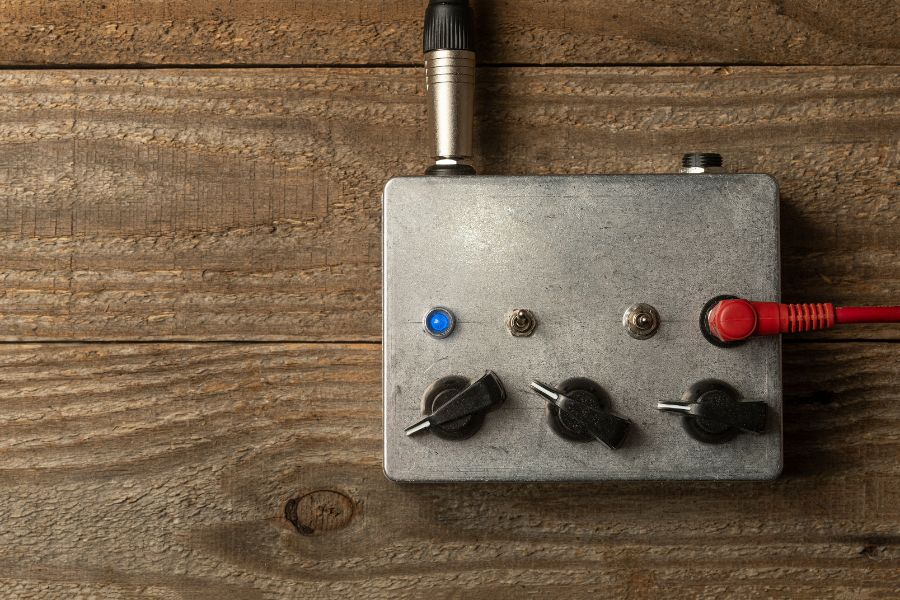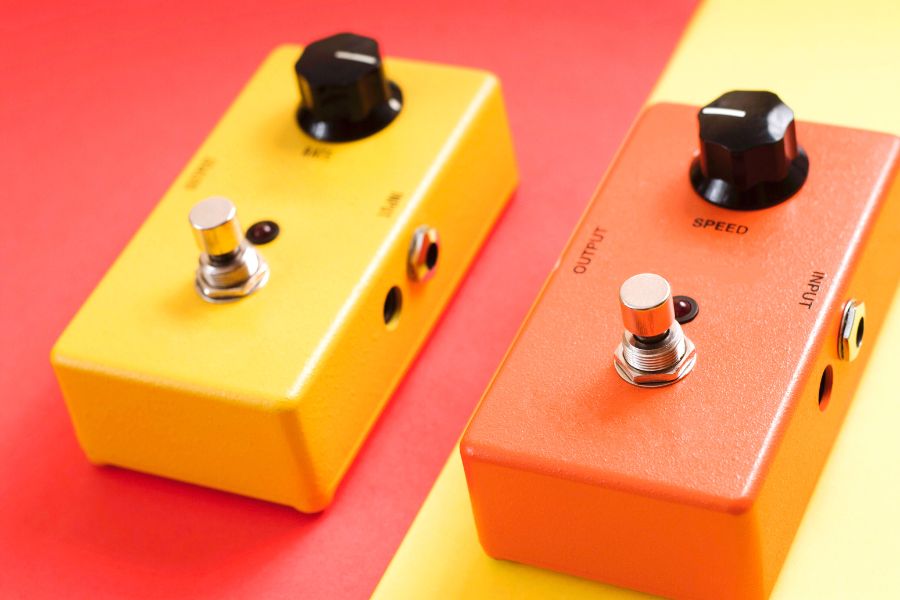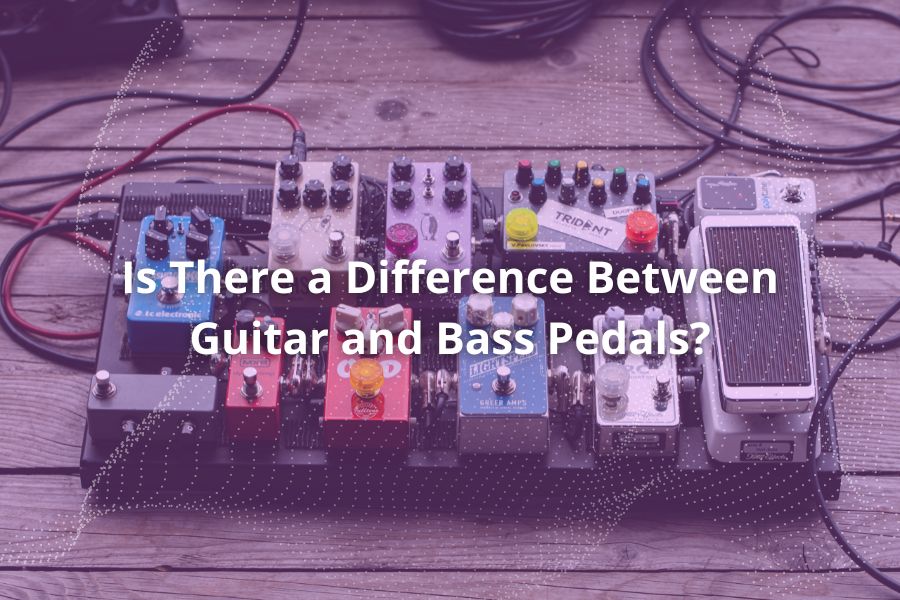Have you ever gazed at your guitar pedal collection and wondered, “Can these little boxes of magic work their charm on my bass guitar, too?” You’re not alone in this sonic curiosity. As musicians, the urge to bend sound in new ways leads to intriguing questions. We share your curiosity and innovative spirit. The dudes are here to break down myths, confirm truths, and guide you through the harmony (and occasional discord) of blending guitar pedals with bass.
The Fundamentals of Bass and Guitar Pedals
When we talk about bass and guitar pedals, we’re essentially discussing devices designed with specific instruments in mind. The core difference lies in their frequency range. Guitar pedals are tailored to enhance and manipulate the higher frequencies guitars produce. In contrast, bass pedals focus on the lower end of the spectrum, ensuring that those deep, resonating bass tones remain powerful and clear.
This distinction is rooted in the pedals’ circuit design. A bass pedal’s circuitry is engineered to manage and amplify lower frequencies without muddying the sound. This means that when you step on a bass pedal, you’re not just getting an effect – you’re getting an effect consciously crafted for the bass’s unique voice. On the flip side, guitar pedals might inadvertently filter out some low frequencies, which can leave bass players feeling like they’ve lost some of their sonic footprint.
Bass guitar effects pedals often include features that cater to the nuances of bass playing. From overdrive pedals that blend clean and distorted signals (maintaining that essential low-end clarity) to modulation effects fine-tuned for the rhythmic role of the bass, these pedals consider how bassists contribute to the overall sound of a band or a track.

Do Guitar Pedals Work on Bass?
Venturing into the terrain of using guitar pedals for bass, one may wonder, “Do guitar pedals work on bass effectively?” The answer largely depends on the type of effect and the specific pedal. Distortion, overdrive, and fuzz pedals designed for guitar, for instance, can produce vastly different results when used with a bass. These effects might clip the bass frequencies in a way that’s not always desirable, leading to a loss of the low-end punch. However, this isn’t a hard and fast rule. Some guitar distortion pedals can add a unique texture to the bass that’s pleasing and musically effective.
Modulation and time-based effects, like chorus or delay, are a different story. These pedals tend to be more forgiving when switched between guitar and bass. The modulation might not be as pronounced on bass due to its lower frequency range, but it can still add a lush, dimensional character to the sound. The key is to listen and adjust the settings to suit the deeper voice of the bass.
When using guitar pedals for bass, keeping an ear out for any unwanted artifacts or tonal changes is crucial. Always remember the best judge of whether a pedal works for your bass is your own ear and the context in which you’re playing.
Optimizing Guitar Pedals for Bass Use
When using a guitar pedal with a bass, the settings you choose can make a world of difference. For instance, dialing back the treble or high-mid frequencies on a distortion pedal can help retain some of the bass’s natural character.
Using an effects loop or a blend pedal allows you to mix the dry, unaffected bass signal with the affected signal, ensuring that your bass’s inherent depth and rhythm aren’t lost.
Consider the pedal’s input and output impedance, which can affect signal strength and clarity. If you’re experiencing signal loss or degradation, a buffer pedal or a dedicated bass DI box with a high-impedance input can help maintain signal integrity throughout your pedal chain.
Using Bass Pedals for Guitar: A Sonic Exploration
Flipping the script, let’s venture into the less explored but equally intriguing world of using bass pedals for guitar. Bass pedals are engineered to emphasize and manage lower frequencies, which can introduce an interesting dynamic when applied to a guitar. The result is often a thicker, more resonant tone that can add depth and texture to your sound. For instance, using a bass compressor on a guitar can yield a smoother sustain and a punchier bottom end, ideal for genres like blues or jazz, where a fuller tone is desirable.
Overdrive and fuzz pedals designed for bass can also create unique results when used with a guitar. They preserve more low-end than their guitar-specific counterparts, resulting in a heavier, more robust distortion. This can be particularly appealing for genres like stoner rock or doom metal, where dense, weighty tones are the order of the day.
Even modulation effects like bass chorus or reverb pedals can offer guitarists a different flavor. These pedals might produce a more subtle modulation on a guitar, lending a nuanced character to the sound that stands out from traditional guitar effects.
The key to effectively using bass pedals for guitar lies in experimentation and adjustment. Playing with the pedal settings, tweaking EQ levels, and exploring their interplay with other guitar pedals can lead to discovering new, inspiring sounds.

Popular Pedals That Cross the Instrument Divide
When exploring the crossover between guitar and bass pedals, it’s worth highlighting some popular pedals that have gained a reputation for working well on both instruments.
One classic example is the Electro-Harmonix Big Muff. Originally designed as a guitar pedal, its rich, creamy fuzz has become a staple on many bassists’ pedalboards for its ability to deliver a powerful, sustained bass distortion without losing low-end depth.
Another notable mention is the Boss DS-1 Distortion, a pedal known for its hard-clipping sound. When used with bass, it can provide a gritty, aggressive edge that cuts through the mix, especially effective in rock and metal genres.
When considering modulation effects, the MXR M234 Analog Chorus is a guitar pedal that adds a warm, liquid texture to the bass, enhancing its melodic capabilities without muddying the sound.
Delay pedals like the TC Electronic Flashback can create atmospheric and spacey textures that enrich the basslines without overwhelming the fundamental bass tones.
Experimentation is key in this journey. The best way to discover if a guitar pedal suits your bass is to try it out in various settings and listen to how it interacts with your bass’s natural sound. Don’t be afraid to tweak the settings, use additional tools like blend pedals, and, most importantly, trust your ears. You might just stumble upon a sound that perfectly encapsulates your musical voice.


